GAP Investments provides tailored financing solutions for investors in Costa Rica, understanding the unique needs…

Costa Rica Pet Relocation: Safe and Smooth Transport
Moving to Costa Rica with your pet is exciting but needs planning. It’s critical to ensure your pet’s safety and well-being during the move. Your pet can come from other countries. However, they must have a special “Veterinary Certificate for Costa Rica.” This certificate is done by a licensed vet and endorsed by your state’s USDA office, or Canada’s CFIA office.
All cats and dogs coming into Costa Rica need up-to-date rabies shots. These shots should be given more than 30 days before the trip. They don’t need to be in quarantine. Dogs need extra shots for distemper, leptospirosis, parvovirus, and hepatitis. Cats should get shots for feline viral rhinotracheitis, feline leukemia, calicivirus, and panleukopenia.
Key Takeaways
- Pets can be brought to Costa Rica from other countries, but they must have a “Veterinary Certificate for Costa Rica” completed by a licensed veterinarian.
- Dogs require additional vaccinations for distemper, leptospirosis, parvovirus, and hepatitis, while cats need vaccinations for feline viral rhinotracheitis, feline leukemia, calicivirus, and panleukopenia.
- Rabies vaccinations must be administered at least 30 days before traveling to Costa Rica.
- Additional vaccinations should be administered no less than two weeks before export for maximum effectiveness.
- The Vet Health Certificate (Form 7001) is valid for 10 days before the flight.
Why Pet Relocation to Costa Rica is Important
Moving to another country with your pet is exciting but needs smart planning for a smooth journey. Costa Rica welcomes pets warmly, with lots of fun stuff for them, like dog parks and pet-friendly beaches. Ensuring things go well involves getting ready and following Costa Rica’s pet import rules closely.
To enter Costa Rica, pets must have specific documents, like a health certificate and proof of being microchipped and vaccinated. It’s key to book places to stay that welcome pets and connect with a trusty vet in Costa Rica. Don’t forget to train your pet to travel in a crate and to double-check the airline’s pet policies.
Costa Rica is very friendly to pets, with spots like parks and beaches made just for them. Teaming up with Costa Rica Immigration Experts helps make moving your pet here a smooth process. They offer key advice and help from start to finish.
| Pet Travel Requirement | Details |
|---|---|
| Health Certificate | A valid health certificate is needed, showing your pet’s vaccinations and microchip info. |
| Rabies Vaccination | Pets need to be rabies vaccinated at least 30 days before their Costa Rica trip. |
| Additional Vaccinations | Dogs need shots for distemper, leptospirosis, parvovirus, and hepatitis. Cats must be vaccinated for a variety of diseases too. |
| Microchipping | It’s recommended that all travel pets have microchips. |
| Travel Options | Pets can fly in-cabin, check as baggage, go as cargo, come by land, or in a private plane. |
By knowing and following these steps, pet owners can make sure their pets have a good start in Costa Rica.
General Tips for Pet Relocation
Before focusing on moving your pet to Costa Rica, here are some good tips to think about:
Consult Your Vet
Talk with your vet to get your pet ready for the travel and make sure they are healthy. Vets can help with shots, health papers, and other things your pet needs.
Consider Your Pet’s Age and Health
Think about how old your pet is and if they are healthy enough for the trip. If your pet is older or has health issues, you might need to do more to keep them safe and comfy.
Research Breed Restrictions
Find out if Costa Rica has any rules about specific pet breeds. Knowing this ahead of time can make everything go more smoothly for your pet.
Choose a Reputable Pet Transport Service
Pick a trusted pet relocation company that knows about sending pets internationally, especially to Costa Rica. They will help with all the paperwork and make sure your pet travels safely and happily.
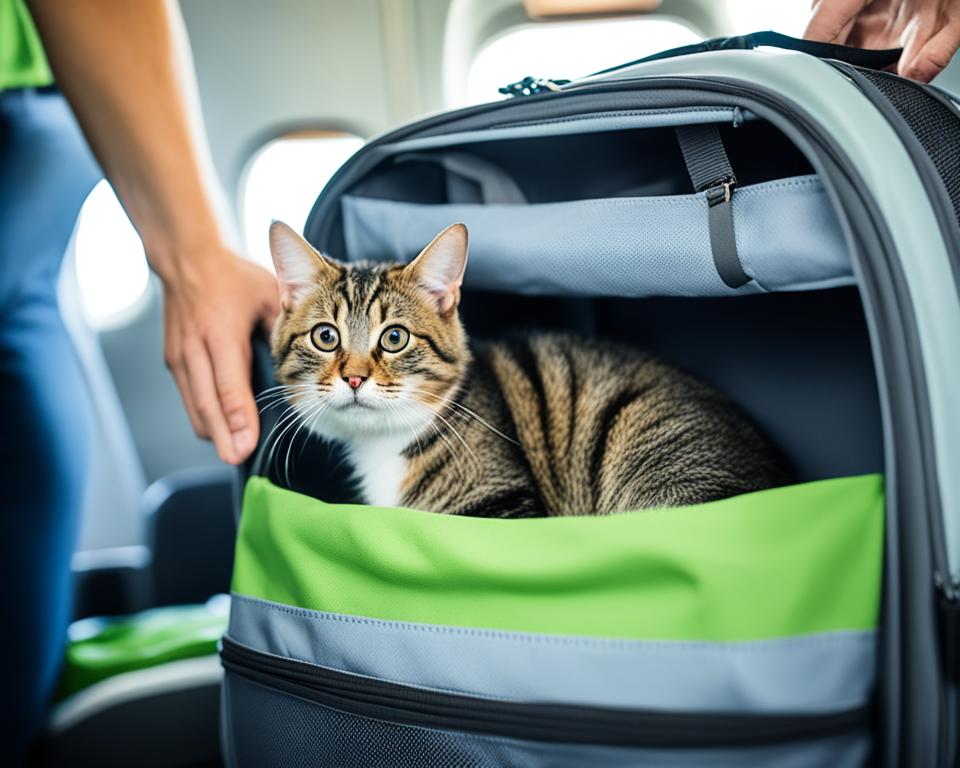
Health Certificate Requirements
To bring your pet into Costa Rica, a health certificate is required. You must meet these main needs:
Obtain the Necessary Form
The health certificate for your cats and dogs must be filled out by a vet. It needs approval from the USDA, APHIS, and the VS. This certificate, called the International Veterinary Certificate, must be in Spanish or have an official Spanish translation verified by the Competent Authority.
Provide Proof of Health and Vaccinations
The certificate should have a unique number and be signed and stamped properly. It must have info about the pet’s rabies shot and other descriptive information. Also, it should include the addresses of the exporter and the consignee, details about the transport, and the signatures of both the Official Veterinary Doctor and the Competent Authority.
Microchipping
Domestic dogs and cats need a check-up two weeks before leaving and a microchip. Make sure this is noted on the health certificate.
Vaccination Requirements
Keeping your pet’s vaccinations current is very important when moving to Costa Rica. The country has rules on which vaccines are needed and when they should be given.
Rabies Vaccination
Dogs and cats over 3 months old must have a rabies shot before coming to Costa Rica. This shot should be given within the last 31 to 364 days before arrival. This keeps your pet safe from rabies.
Distemper, Hepatitis, and Other Vaccinations
Dogs also need shots for distemper, hepatitis, leptospirosis, and parvovirus. These must be given no more than 30 days before entering Costa Rica. Cats need shots for feline viral rhinotracheitis, calicivirus, panleukopenia, and feline leukemia before they arrive.
Sticking to these vaccination rules is vital for your pet’s well-being and following Costa Rica’s pet import laws. Keeping your pet’s vaccines up to date will make the moving process easier and stress-free.

Parasite Control and Treatment
To move your pet to Costa Rica, follow their pet import requirements. Make sure your pet is clear of bugs inside and out. This includes ticks, fleas, and tapeworms.
Remember to get your pet treated for bugs within 15 days before going. They must not have any parasites when they reach Costa Rica. Besides bug treatment, they need to have all necessary vaccinations. And a vet must check and say your pet is healthy before they go.
| Treatment | Cost |
|---|---|
| Frontline (Flea and Tick) | $21.29 |
| Interceptor (Heartworm and Parasite) | $8.80 |
Making sure your pet is bug-free helps you in the move. Good parasite control and treatment is essential. This way, you meet Costa Rica’s rules on pet travel and import.

Costa Rica Pet Relocation
When moving to Costa Rica with a pet, you have a few options. You can choose to take them with you in the cabin or send them as cargo. The choice depends on the pet’s size, the airline’s rules, and your preference. By knowing the different ways to transport pets, you can make the journey easier for both you and your pet.
In-Cabin Travel
If your pet is small, like a cat or small dog, they can often fly in the cabin with you. This is less stressful for your pet and means they stay near you. Make sure to check your airline’s pet policy and book your pet’s spot early. There’s only limited room for pets in the cabin.
As Luggage
Another way is to check your pet in as extra luggage. This is an option on airlines like Alaska Airlines. It can be cheaper than shipping your pet as cargo. But, always ensure your pet is comfortable and safe during the trip.
As Cargo
For larger pets or ones that can’t be in the cabin, sending them as cargo might be best. This involves a freight forwarding company and a careful check of airline cargo policies. Choose a service with experience in moving pets across borders.
Via Land Border
If you’re moving from a nearby country, you might drive with your pet to Costa Rica. This is cheaper and less stressful for some pets. But, make sure your pet’s health and papers are in line with Costa Rica’s rules.
By Private Plane
Chartering a private plane offers great control and privacy. It avoids some concerns with commercial flights. But, it’s more costly and needs extra planning.
Whatever option you pick, choose trusted pet transport services. It’s important to meet Costa Rica’s pet entry requirements. This ensures a smooth move for your furry friend.
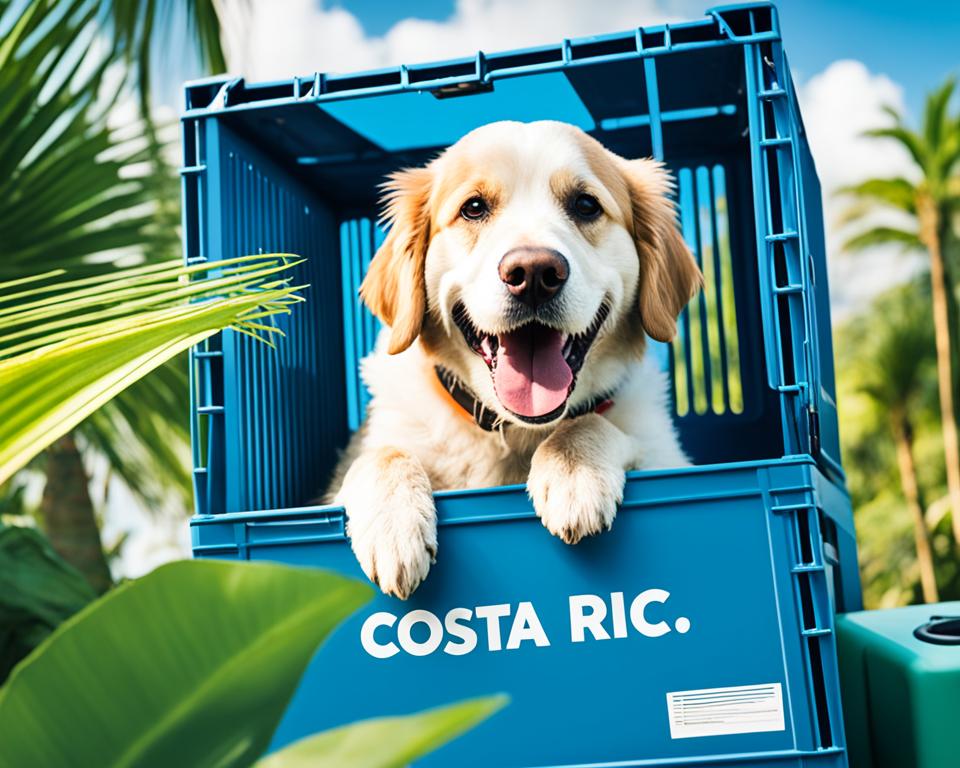
Airline and Travel Crate Requirements
Choosing a pet-friendly airline is key to moving your pet to Costa Rica. Look for airlines that welcome cats and dogs under 20 lbs to travel with you. For example, Alaska Airlines allows pets to go as extra checked baggage.
Your pet’s crate must be spacious, well-ventilated, and cozy. Crates meant for travel should follow the IATA’s guidelines. This helps keep your pet safe and comfortable during pet air travel or pet shipping to Costa Rica.
Please think about getting your pet microchipped for extra safety. While it’s not a must for moving pets to Costa Rica, make sure your pet is vaccinated. They should have shots against rabies, distemper, hepatitis, leptospirosis, parvovirus, and parainfluenza.
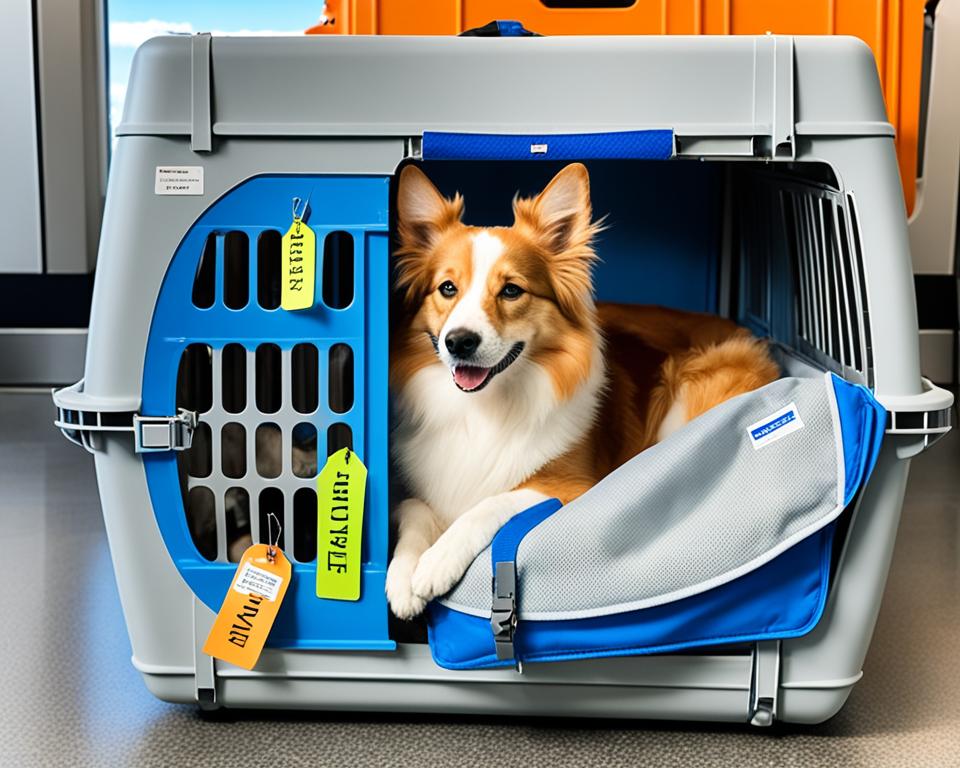
Pick a pet-friendly airline and the right travel crate for your pet. This way, your furry friend will have a safe and comfy trip to Costa Rica.
Arrival and Customs Procedures
When you bring your pet into Costa Rica, make sure customs knows you’re arriving with your pet. You must show them certain documents when you reach the country. This includes a filled out Veterinary Certificate for Costa Rica (APHIS Form 7001) and your pet’s vaccination records. Your pet’s rabies vaccine should be up to date.
If your pet is coming to Costa Rica for business or as cargo, you’ll need an Import Permit from the Animal Quarantine Offices. This permit costs about $20. You also have to give a copy of your passport along with your pet to get through customs.
Using the International Certificate (APHIS FORM 7001) is a good idea for small animals coming into Costa Rica. Make sure you check if you need any extra documents depend on how long your pet will stay. It’s important to always be ready with the right documents.
By following the pet import requirements costa rica carefully, you can move your pet to Costa Rica without trouble. This will make the whole process easy for both you and your pet.
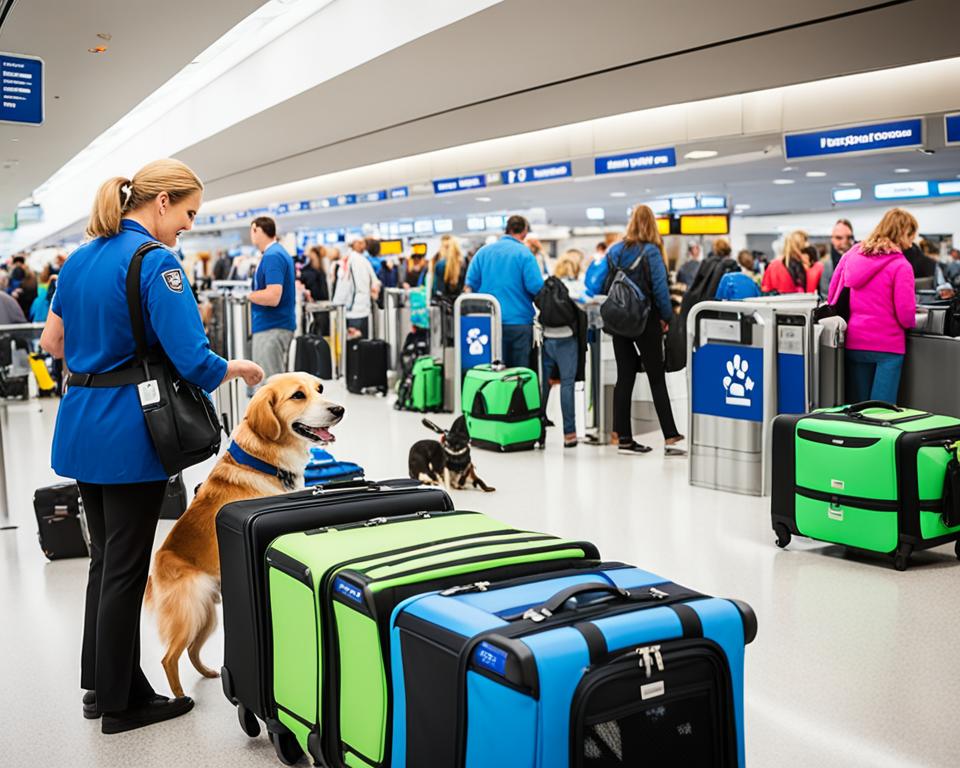
Finding Pet-Friendly Accommodations
Moving to Costa Rica with your pet means finding the right place to stay. Many places in the country are happy to welcome your pet. Look at websites and talk to travel experts who know about pet-friendly places. They are great for finding the best spots for you and your furry friend.
Tamarindo and Playa Flamingo are great places to visit. They have lovely beaches and activities. If you use Airbnb or Booking.com, you can easily find places that allow pets. Their search filters make it easy.
Before you book a place, make sure you understand their pet rules. Some places have rules about the size or type of pet you have. Others might ask for a deposit. It’s a good idea to check these things to avoid any surprises.

By looking for the right place, your pet will feel at home in Costa Rica. It’s a beautiful country that loves pets.
Choosing a Reliable Veterinarian
When moving your pet to Costa Rica, finding a good vet is very important. Start by asking for advice from locals and expats. Look for pet relocation services costa rica and vet clinics, and read reviews online. This helps find a vet you can trust and who knows what they are doing.
Getting to know a good pet travel costa rica vet is comforting. They are up to date with all the pet relocation costa rica requirements and can make the process easier. They can help with vaccinations, health papers, and everything else you need for your pet transport costa rica or moving your pet to Costa Rica.
With a trusted vet in Costa Rica, your pet’s health is in good hands. This ensures that moving with your pet is as stress-free as possible.
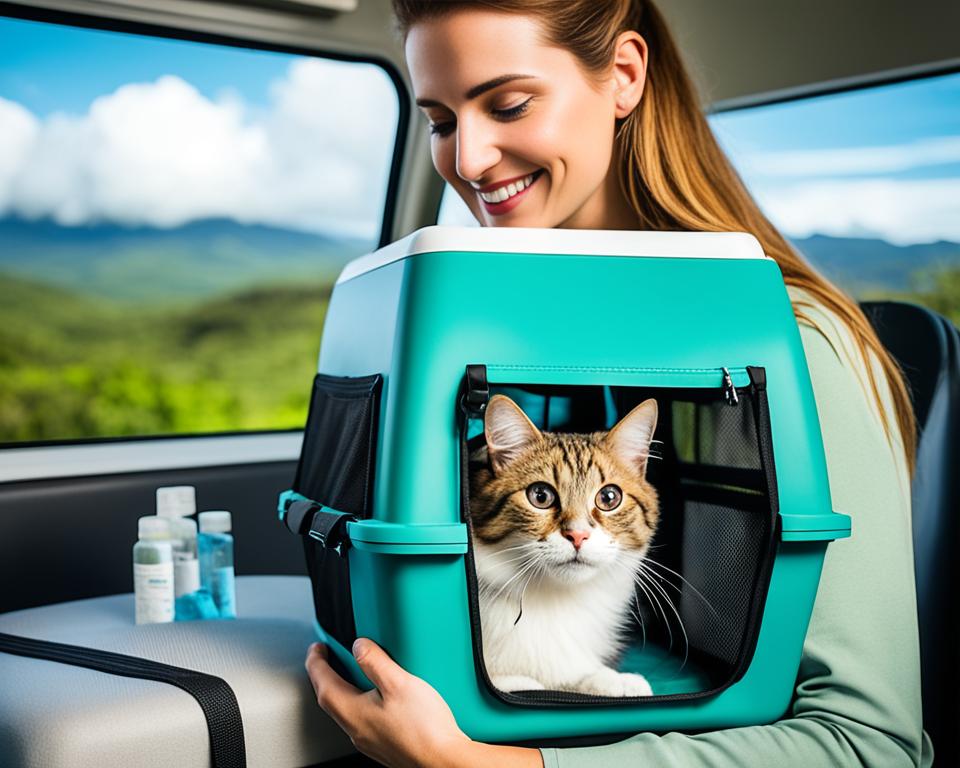
Crate Training Your Pet
Crate training helps keep your pet safe and secure when traveling. It’s important for pet travel regulations and pet immigration requirements to Costa Rica. To start, introduce the crate to your pet slowly and positively. Then, increase crate time gradually, always making it a good experience with treats or toys. If you need help, talk to a pet relocation companies or pet ground transportation expert.
For those moving to Costa Rica, many pet transport services costa rica and specialists in pet travel documentation costa rica advise on crate training. A pet that’s used to the crate is often less anxious and behaves better. This makes the move easier for you and your pet.

Pet-Friendly Culture in Costa Rica
In Costa Rica, pets are becoming more like family. This change is clear with more dog parks and pet beaches. For instance, Escazu has three dog parks now. It shows that more people want special places for their pets.
Dog Parks
Dog parks in Costa Rica are getting popular. This shows a new way of thinking. More people, especially the young ones and those who lived in pet-loving places, see their pets as family. This is a big change from before, when dogs were not seen in all homes. Now, there is a bigger need for places like dog parks for pets to be active and play together.
Pet-Friendly Beaches
Costa Rica has not only made dog parks but pet beaches too. Here’s more about the pet culture in the country. Having pets join in on fun at the beach shows the country values animals in people’s lives.
Veterinary Care
Costa Rica also takes care of pets’ health very well. They have great vet clinics for check-ups and more. Owners can trust their pets to get the best care here.
Conclusion
Moving to Costa Rica with your pet can be easy and gratifying. It requires the right preparation and following the country’s rules. Make sure to research health certificates, vaccinations, and the best transport options.
Also, find pet-friendly places to stay and a good vet. Costa Rica’s pet-friendly vibe includes things like dog parks and beaches. This makes it a great place for pet owners.
Starting the import process at least six weeks early is important. You’ll need health certificates, vaccination records, and microchip ID proof. The shipping costs for pets to Costa Rica can vary from $200 to $400.
Hiring professional pet movers can help you a lot. They know the rules and how to make moving easy for both you and your pet. With the right planning and a warm welcome in Costa Rica, the trip with your pet can be fun and beneficial.
FAQ
Can I bring my pets with me when I move to Costa Rica?
Yes, you can bring your pets to Costa Rica. But, it’s important to follow certain steps. These make sure the move is smooth and legal.
What are the main requirements for bringing a pet to Costa Rica?
You need a “Veterinary Certificate for Costa Rica” for your pet. Also, their rabies shot must be current. Plus, bring proof of any other needed shots. Luckily, no quarantine is needed.
What vaccinations does my pet need to enter Costa Rica?
Dogs need vaccines for rabies, distemper, leptospirosis, parvovirus, and hepatitis. Cats should have vaccines for rabies, feline viral rhinotracheitis, feline leukemia, calicivirus, and panleukopenia.
How do I transport my pet to Costa Rica?
You can choose from different ways to bring your pet. This includes in the cabin, as checked luggage, cargo, by land, or with a private plane. Pick an airline that loves pets and a suitable travel crate.
Do I need to do anything special when my pet arrives in Costa Rica?
When your pet lands, you have to let customs know. Show all the needed papers, like the health cert and vaccination records.
How do I find pet-friendly accommodations in Costa Rica?
Lots of places in Costa Rica are okay with pets. Use websites and travel agents focused on pet travel. They’ll help you find the right place to stay with your furry friend.
How do I find a reliable veterinarian in Costa Rica?
Ask others who’ve moved to Costa Rica with pets for advice. Look up local vet clinics and read online reviews. This way, you can find a doctor you can trust near you.
Source Links
- https://www.petrelocation.com/country/costa-rica
- https://crie.cr/costa-rica-pet-relocation/
- https://startabroad.com/locations/costa-rica-country-guide/costa-rica-safely-relocate-pet/
- http://www.costarica-embassy.org/sites/default/files/docs/PETS REQUIREMENTS FOR THE IMPORTATION JUNE 2019.pdf
- https://www.pettravel.com/immigration/CostaRica.cfm
- https://uvitalawfirm.com/pet-travel/
- https://bluewaterpropertiesofcostarica.com/blog/move-with-pets-to-costa-rica-requirements-need-to-know/
- https://www.specialplacesofcostarica.com/blog/costa-rica-pet-travel/
- https://www.coldwellbankertamarindo.com/article/packing-up-and-moving-to-costa-rica-with-pets
- https://mytanfeet.com/about-cr/taking-your-pet-to-costa-rica/
- https://www.worldpettravel.com/international-pet-travel-destinations/costa-rica-pet-move/
- https://crie.cr/shipping-pets-to-costa-rica/
- https://www.costarican-american-connection.com/the-ultimate-guide-to-traveling-or-relocating-with-your-pet-to-costa-rica
- https://petloungecr.com/
- https://www.expat.com/en/guide/central-america/costa-rica/12581-traveling-to-costa-rica-with-your-pet.html
- https://www.liveincostarica.com/blog/pet-culture-and-stray-dogs-in-costa-rica.html
- https://crie.cr/importing-pets-to-costa-rica/


